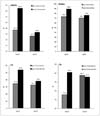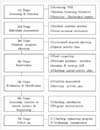Abstract
This study aimed to plan nutrition support programs for the elderly living alone whose nutrition status were seriously concerned, conducted seven stages nutrition intervention program on a trial basis, and evaluated the effectiveness of the program of the Elderly Nutrition Support Project. Subjects were selected for personalized nutrition management based on nutritional risk score and nutrition intervention were tailored to the problems occurred. The elderly nutrition support program targets were 44 senior citizens who lived alone with low income. The 33 (as Type 1) of the subjects with whom milk, tofu, seaweed, eggs, black beans have been supported, and also provide nutrition education, and the rest 11 persons (as Type 2) to whom food was not supported but provide nutrition education programs. As a result, all subjects showed that compared with pre and post program implementation, their daily exercise time and milk and protein consumption level were increased and some improvement was observed regular meals consumption and low-salt diets. Their nutrient intake level such as calories, protein, calcium, iron improved after implementation. In addition, NSL DETERMINE scores significantly improved from 13.21 to 7.24 in Type 1 and 11.27 to 9.91 in Type 2. As positive dietary behavioral changes were observed as in that they purchased more protein and calcium rich foods.
Figures and Tables
 | Fig. 2The self recognition rate of health impairment and absence rate of kitchen appliance of subjects. |
 | Fig. 5The changing patterns of % DRI between pre-intervention and post intervention. Type 1) nutrition education and food supporting (n = 33), Type 2) only nutrition education (n = 11) |
References
1. Available from http://www.aoa.gov/AoARoot/AoAprograms. cited 2011 November 24.
2. Choe JS, Baeg HY. Seasonal variation of nutritional intake and quality in adults in longevity areas. J Korean Soc Food Sci Nutr. 2004. 33(4):668–678.
3. Choe YJ, Park YS, Kim C, Jang YG. Evaluation of functional ability and nutritional risk according to self-rated health (SRH) of the elderly in Seoul and Kyunggi-do. Korean J Nutr. 2004. 37(3):223–235.
4. Choi YJ, Kim C, Park YS. The effect of nutritional education program in physical health, nutritional status and health-related quality of life of the elderly in Seoul. Korean J Nutr. 2007. 40(3):270–280.
5. Chung SH, Sohn CM. Nutritional status of hospitalized geriatric patients using by the mini nutritional assessment. Korean J Community Nutr. 2005. 10(5):645–653.
6. Dwyer JT. How will Koreans meet this challenge? Longevity and Quallty of Life in the 21st century. International Symposium in Commemoration of the 50th Anniversary of Seoul National University. 1996. 59–81.
7. Forger-Levit E, Lau D, Csima A, Krond IM, Coleman P, West BR, Wood L, Hanger VF, Schugart GS. Food service in institutions. 1977. New York: John Wiley & Sons;20–23.
8. Han KH, Choi MS, Park JS. Nutritional risk and its related factors evaluated by the mini nutritional assessment for the elderly who are meal service participants. Korean J Nutr. 2004. 37(8):675–687.
9. Jun BH. An investigation of the intake of the health food among the salarymen in Seoul. J Korean Soc Food Sci Nutr. 2000. 16(1):9–16.
10. Kang NE, Lee JY. The analysis of effect on nutrition education program for the elderly in Sung-nam area. J Korean Soc Food Sci Nutr. 2006. 18(4):357–366.
11. Kang Y, Kim MY, Eliza L. The relationship of perceived health status, activities of daily living and nutrition status in the community-dwelling Korea elderly. J Korean Acad Nurs. 2008. 38(1):122–130.
12. Kennedy ET. Evidence for nutritional benefits in prolongig wellness. Am J Clin Nutr. 2006. 83:410s–414s.
13. Kim IS, Yu HH, Kim YS. A study on nutrient intake, food behavior and health conditions according to food intake diversity in the elderly in a local city. Korean J Community Nutr. 2001. 6(2):205–217.
14. Kim KN, Hyun TS, Lee JW. Development of a simple screening test for identifying Korean elderly at risk of undernutrition. Korean J Community Nutr. 2000. 5(3):475–483.
15. Kim YH, Ha TY, Lee BH. A comparative analysis of mental status, dietary life and nutritional status among senior citizens with or without leisure activities in urban area. Korean J Soc Food Sci Nutr. 2006. 35(4):422–429.
16. Kim YS, Kim SR, Jang YH, Kim DS, Kim KH. A case study on effects of Nutrition-Plus Program-Based on infants and children under age 6 and their mothers in Naju region. J Reg Stud. 2011. 19(3):145–155.
17. Korea National Statistical Office. Dependency Ratios & Aged-child ratio. Population Projections 2010. 2010.
18. Korea Health Industry Development Institute. Development of a health promotion program for the elderly. 2009.
19. Kwak EH, Lee SL, Yoon JS, Lee KS, Kwon CS, Kwun IS. Macronutrit, mineral and vitamin intakes in elderly people in rural area of North Kyungpook province in South Korea. Korean J Nutr. 2003. 36(10):1052–1060.
20. Lee DH. The effects of quality of life in the elderly's health condition. J Korean Gerontol Soc. 2010. 30(1):93–108.
21. Lee HS, Chang MJ. Effect of family type on the nutrient intake and nutritional status in elderly women. J Korean Soc Food Sci Nutr. 1999. 28(4):934–941.
22. Lee JS. Older American Act nutrition programs, Workshop Booklet of KHIDI. 2009.
23. Lee KW, Lee YM, Kim JH. The health and nutritional status of low-income, alone-living elderly. Korean J Community Nutr. 2000. 5(1):3–12.
24. Lee OH. A comparison of nutritional status and muscle strength of elderly women in a social welfare center and those residing at home. Korean J Community Nutr. 2002. 7(5):603–614.
25. Lee YM, Oh UJ, Kim YO. Nutrition education mannual for elderly. Research report of Korean Health Promotion Foundation. 2009.
26. Mattes RD. The chemical senses and nutrition in aging: Challenging old assumptions. J Korean Soc Food Nutr. 2002. 24(4):530–536.
27. Moon HK, Kong JE. Reliability of nutrition screening using DETERMINE checklist for elderly in Korean rural areas by season. Korean J Community Nutr. 2009. 14(3):340–353.
28. Park MY, Lee KH, Youn HS. Nutrition status of rural elderly living in Kyungnam-Focusing on health-related habits, dietary behaviorsand nutrition intakes. Korean J Community Nutr. 2001. 6:Suppl. 527–541.
29. Posner BM, Jette AM, Smith KW, Miller DR. Nutrition and healthy risk in the elderly. The Nutrition Screening Initiative. Am J Public Health. 1993. 83:972–978.
30. Son SM, Park JK. The changes of dish consumption frequencies, dietary attitude and health-nutrition risk for single living female elderly on food-aid program. J Korean Diet Assoc. 2005. 11(3):286–298.
31. Yang EJ, Bang HM. Nutritional status and health risks of low income elderly women in Gwangju area. Korean J Nutr. 2008. 41(1):65–76.
32. Yoon HJ, Lee HK, Lee SK. The health status and nutrient intakes of elderly female in Daegu area. Korean J Community Nutr. 2007. 12(1):50–57.
33. Yim KS. The effects of a nutrition education program for hypertensive female elderly at the Public Health Center. Korean J Community Nutr. 2008. 13(5):640–652.




 PDF
PDF ePub
ePub Citation
Citation Print
Print











 XML Download
XML Download